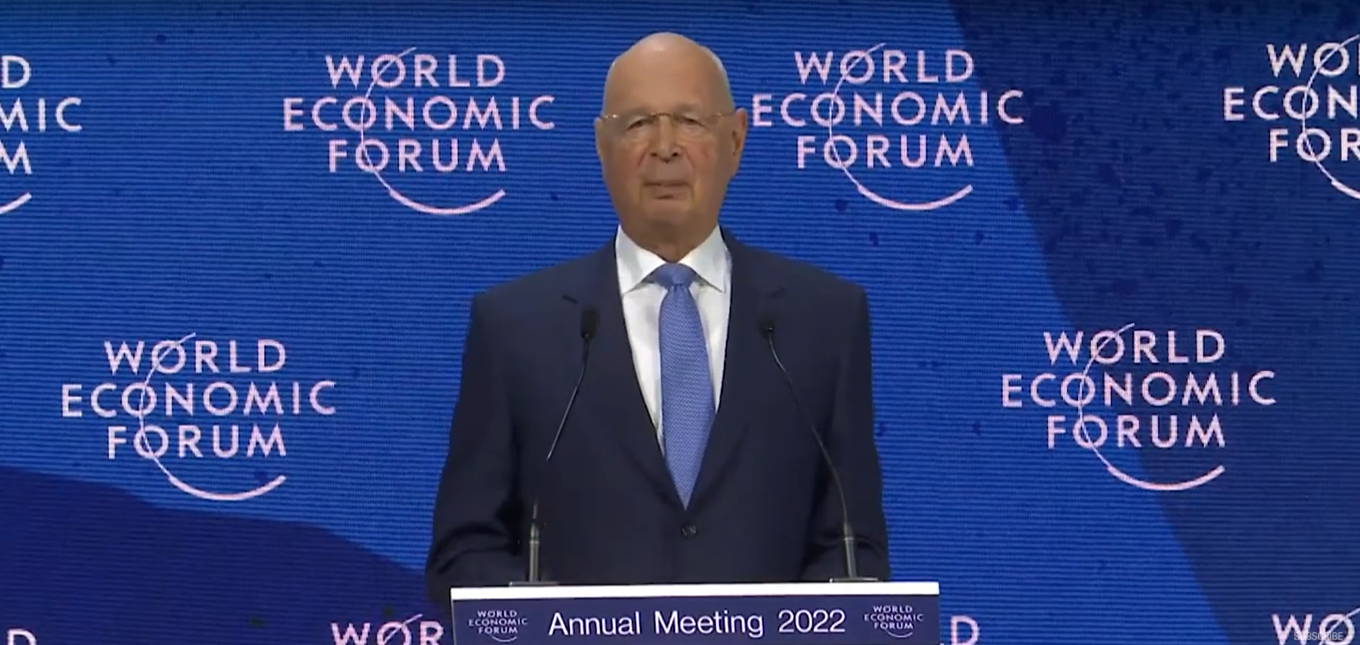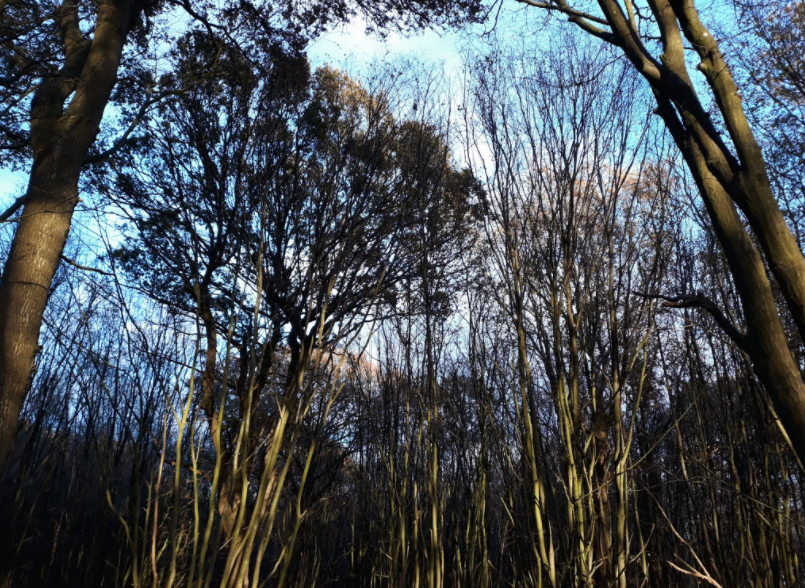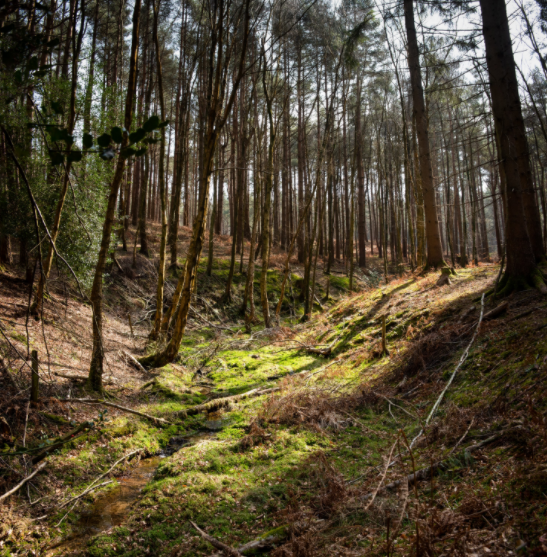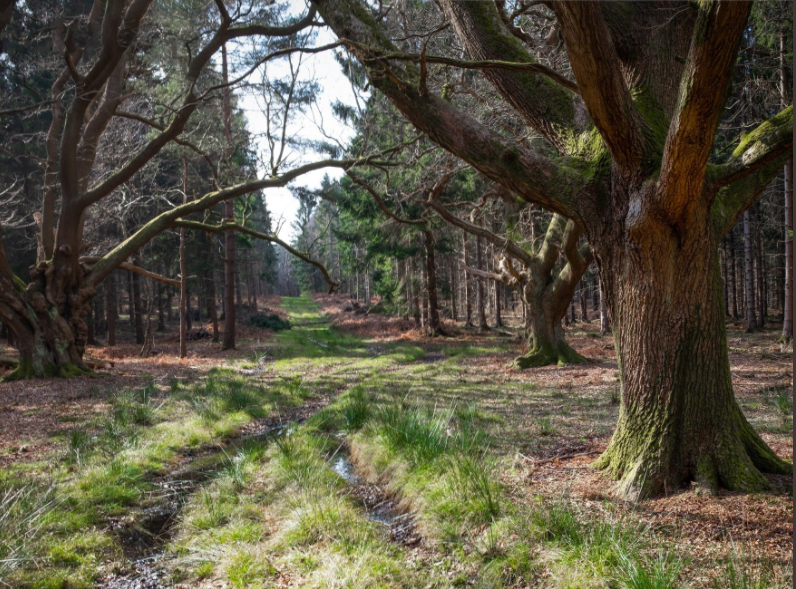-
Defeating the demons of Davos

In this issue:
1. Defeating the demons of Davos
2. The Great Resist: uniting against the empire!
3. A triple revolution for life
5. Richard Jefferies: an organic radical inspiration
6. Acorninfo
1. Defeating the demons of Davos
Regular Winter Oak readers will already be well aware of the World Economic Forum, particularly if they have ploughed through our October 2020 analysis of its vile aims as revealed in three books by its boss Klaus Schwab.
So it will have come as no surprise to hear Schwab opening the 2022 WEF gathering at Davos in Switzerland with talk of “the global agenda” and “our global system”, spouting forth about improving “the state of the world” when he actually means imposing one.
For those who have followed our various revelations about the close relationship between the intersectional social-impact “left” and the financial mafia behind the Great Reset, his mention of the presence at Davos of a younger generation of “social entrepreneurs” will be self-explanatory.
Schwab described the WEF as “the international organization for public-private co-operation”.
This corportatist arrangement, which openly puts the machineries of the state at the disposal of private business and finance, was the economic model for the 20th century Fascist and Nazi regimes.
The subtitle for this year’s Davos theme was “Government Policies and Business Strategies”, but the WEF could have replaced the “and” with a simple “/”, because in their “stakeholder” model the two are exactly the same thing!
Schwab explicitly cited “low growth” as a major problem today, by which he means that his “business partners” are not making as much profit as they would like to.
But never fear! The hand of destiny is reaching down in the form of various “crises” which will enable the government side of the collaboration to bail out their private Davos chums without gullible TV-watching citizens being any the wiser.
Top of these acts of providence, as identified by Schwab in his speech, is the war in Ukraine.
It is telling that he didn’t feel the need to express any regret or concern for all the men, women and children on either “side” who have been killed, injured or displaced by the conflict.
Instead, he merely reflected with evident satisfaction that it would “reshape our political and our economic landscape in the coming year”.
Wars have always been good for “the economy”, what with arms sales, lucrative loans to governments and all the lovely contracts and investment opportunities involved in the need to “build back better”.
The second big issue was Covid, with Schwab stressing the need to reinforce our “resilience” against “a new virus, possibly, or other risks which we have on the global agenda”.
There is always a plentiful supply of “risks” for which “solutions” can be sold by the global greed community, not least in Schwab’s third theme of climate change.
The fourth topic he listed was the holy cow of “the economy” itself. Although he tried to put the emphasis on tackling “poverty”, his mention of “impact-oriented initiatives” will reveal to alert readers that the idea is rather to transform poverty into yet another source of profit for “social entrepreneurs” and fat cat speculators.
Not for nothing did Schwab declare that Davos 2022 boasts “a rich programme”…
Besides this increasingly familiar and reliably odious agenda, Schwab’s speech was also noteworthy for its tone of inflated self-importance.
Embracing the main title of the event, “History at a Turning Point”, Schwab announced grandly, with more than hint of megalomania: “The future is not just happening; the future is built by us, by a powerful community as you here in this room”.
But although the WEF boss was doing his very best Great Dictator impression, his over-confident puff pointed to an underlying weakness.
The Great Reset was not launched because Schwab and his backers were already in full control but because they knew that they risked losing control as their global Ponzi scheme collapsed and people rose up everywhere to tear down their ill-gotten citadel of power.
As Michael Driver wrote in a May 24 piece on the CW website: “Technology has deluded the Davos drone into believing he has a tool of the gods. A hubris as old as man. Fortunately, the world interacts to create an unseen and unpredictable future which no amount of Schwabist shaping can control.
“The history books are littered with the corpses of centralised top-down ideas. The reason why we are not talking enough about the impossibility of Klaus Schwab’s Great Leap Forward is because the opposition are guilty of the same failure of basic understanding.
“The opposition is making the flawed assumption that this project is doable. In fact, the future is resistant to shaping. What we should all be preparing for us the failure of the WEF’s programme. This should be a cause of profound optimism.
“We are on the right side of history; they are on the precipice”.
For all their money, all their power, all their weapons and all their toxic technology, the Great Resetters will not succeed in enslaving humanity for their parasitical profit.
Their noxious “future” will come tumbling around them before it has even got properly started, just like Adolf Hitler’s “thousand-year” New Order.
The real turning point in history will be the defeat of the demons of Davos.
2. The Great Resist: uniting against the empire!
One of the most extraordinary achievements of the so-called Great Reset has been to create a massive new wave of worldwide resistance to its overall programme!
While Schwab et al may well have hoped that this movement would be halted by the sudden switch of emphasis from “pandemic” to war, the long-term effect looks more like broadening and solidifying resistance to a monstrous system whose many heads are now very obviously all connected to the same slimey body.
Italy, for instance, is witnessing a certain convergence, under the Great Resist banner, of opposition to vaccine passports, the EU and NATO.
Lazio councillor Davide Barillari is well known for his opposition to the “Green Pass” and associated injections.
He is also a leading opponent of the American military presence in Italy – there are dozens of US bases there, some secret, hosting 13,000 troops.
The Ukraine conflict has stoked opposition to this de facto post-WW2 occupation of Italy, with various campaigns and protests springing up.
At the end of April, Barillari published on his website an incendiary third-party text entitled “Enough lies! Italy must get out of NATO!”.
The anti-system convergence has also been noticeable at protests like that in Genoa, where people marched for “peace and freedom”.
The same phenomenon is apparent in Germany, another place with a heavy US military presence.
People have been taking to the streets across the country calling for “peace, freedom and self-determination”: in Reutlingen, Osnabrück, Keulen, Bautzen, Hamburg, Düsseldorf, Pforzheim-Haidach, Ulm, Nuremberg…
In France, just a week after Emmanuel Macron managed to win the presidential election, there was a massive Mayday anti-government protest in Paris which saw the police pick up on the levels of militarised brutality used against the Gilets Jaunes since 2018.
And in Ireland, photo-journalist Robert Pierzynski has been recording a series of freedom demonstrations, such as this one in Galway on May 22.
Outside Europe there have been protests in New York, Ottawa, Melbourne and Johannesburg, amongst many other places.
As our recent online poll unsurprisingly revealed, the vast majority of human beings have no desire to become slaves of the ruling mafia in a technocratic transhumanist world state!
3. A triple revolution for life
by Paul Cudenec via network23.org
One massive positive has emerged from the brutal attack on our freedom and happiness launched under cover of the Covid “crisis”.
The complete collapse of the “left” (including large parts of its deeply-degraded anarchist wing) led to an ideological vacuum on the side of the resistance to the so-called Great Reset.
This vacuum has not been filled by the far right, as I suspect those in power would have preferred, but by a new phenomenon which has not yet acquired its own name.
Its particular strength and potential comes from the way in which it has reintroduced both a sense of the spiritual and a feeling for nature into the realm of political radicalism from which they had long since been banished.
I have been vastly encouraged to come across, both in the written word and in real life, increasing numbers of voices speaking from this inspirational philosophical place.
The latest example of this 2020s neo-revolutionary Zeitgeist to fall into my hands is a short book by philosopher and science-fiction writer Léafar Izen, which parallels in many ways my own 2022 book The Withway.
Written in Chile and published in France, it is entitled La Révolte du Ressentant, which translates as The Revolt of… Well, of what exactly? The word means “feeling” but that doesn’t seem like quite the right translation here.
Happily, the author sets out the precise meaning of his term, describing ressentant as the “capacity to feel that something exists, even if this feeling is not accompanied by any complex thought, even by the idea that there is such a thing as a ‘me’, a world or time… Ressentant is the sensation of being in its stripped-down, essential, fundamental state”. (1)
The key point here is that ressentant (might we say “awareness” in English?) is not at all the same as the “I think therefore I am” type of human individual consciousness as presented by René Descartes.
Fundamental ressentant is instead “an indivisible whole, a common base for all manifestation” (2) with a “mysterious and thus sacred nature”. (3)
This vital sense of presence is shared by all those who belong to this living universe; even, Izen says, by a humble earthworm.
“With the few hundred neurones with which nature has provided it, everything that it feels – the taste of the earth, the surrounding humidity, vibrations in the ground, its own digestive system – probably forms part of one and the same experience of being.
“The ingredients which make up this cocktail of ressentant might certainly appear rudimentary, but can we neverthless be sure that the earthworm is excluded from ressentant or even that it feels existence in a less intense way?” (4)
The outlook being expressed here is clearly what is sometimes called pantheism, but which, in the absence of any mention of God, might better be termed ‘panenhenism’, or ‘all-in-one-ism’. (5)
Izen notes: “There is nothing new about this idea of fundamental ressentant; it is as old as the world”. (6)
Quoting organic radical thinkers Mohandas Gandhi and Carl Jung in his book, Izen shares my own view that there is enormous potential in basing a contemporary political philosophy on this age-old metaphysical gnosis.
This ancient wisdom represents a crucial antidote to the blinkered techno-scientific mindset which dominates the modern world.
At least as close-minded as the religious dogma from which it claims to have freed us, ultra-materialism is the root of all the ills of our world, such as productivism, economic growth and consumerism, says Izen
It is now trying to steer us into a world of transhumanism “which could lead to the obsolesence of part of humankind”. (7)
“This ultra-materialist tendency, which denies the sacred nature of ressentant, is creating an unprecedented danger, that of regarding the human species as a herd of cattle whose profitability has to be maximised and whose weak links should gradually be replaced by machines”. (8)
Countering this ultra-materialist thinking with the idea of ressentant is therefore not just some kind of philosophical game, he insists, but “the sinews of a war in which what is at stake is nothing less than Life and its possible annihilation”. (9)
A “profound evil” is “gnawing away” (10) at our societies more than ever, writes Izen and he warns of the grave consequences of forgetting “the sacred character that ressentant gives to Life” (11) as well as our duties to each other as part of that shared Whole.
“Progressively, in the narratives which knit human societies together, the sacred disappears from the world, allowing homo sapiens to pass off as the necessary march of progress, practices which, without this withdrawal of the sacred, would be considered sacrilege”. (12)
The shadow of Covid inevitably looms over the pages of his book and he addresses in particular the disabling effect of the fear of death on individuals who have forgotten that they are part of something much bigger.
For those who feel their belonging to the Whole, death is no longer blackness and oblivion but “a transformation of the ressentant“, he says, comparing our individual lives to ocean waves which eventually break on the beach “without the ocean of ressentant losing a single drop”. (13)
These last years have revealed “to what point the fear of death is an instrument of absolute governance”, (14) observes Izen.
“Is it not fear that prevents us from living fully, from finding joy in the moment, from being free, from loving, from revolting? No power over us is possible without a certain dose of fear”. (15)
“Who would have believed that democratic societies would have accepted without discussion such suspensions of liberties and measures of such incoherence? Who would have believed that a democratic government would ever ban, without discussion, an act as simple as visiting friends or family or buying a book in a bookshop? But we are prepared to surrender this freedom, and numerous activities that were the salt of our lives, rather than confront the risk of death”. (16)
In the face of this tyranny, he calls for a “triple revolution” which must be personal, local and global.
On the personal level, we all need to rediscover the sense of universal ressentant (universal withness in my terminology), which can empower us to take on and defeat the robotic forces of dehumanising darkness
“You have to have at least the intutition of something superior to your own existence in order to risk your life”, (17) stresses Izen.
“We have a deep need for this banner of ressentant to lead the struggle on the other fronts. That is what can give us the strength and courage to lift up our heads and take back control of our lives by acting, locally and globally.
“For closeness to this fundamental ressentant gives us the courage to act for a certain idea of Humanity and for Life”. (18)
On the local level we need to recreate the social connections which have been “destroyed by decades of individualism, by the virtualisation of exchange and more recently by successive lockdowns”. (19)
By rediscovering the savoir-faire once possessed by our predecessors, we can become independent of the system and learn to feed ourselves, look after each other and produce our own culture and leisure activities free of the manipulative control of power.
Izen writes: “In truth, this local revolution has already begun. Everywhere we are seeing the flowering of initiatives leading in this direction. All these initiatives give the lie to the defeatist notion that homo sapiens are fundamentally selfish creatures, condemned to destroy each other”. (20)

On a wider scale he sees much potential for revolt against the system, particularly in France, whose Gilets Jaunes movement represented a serious popular challenge to the authorities.
“If the Covid crisis gave them a bit of respite, they are perfectly conscious of sitting on a powder keg and that’s why they’re tightening the screws”. (21)
The revolution on the global scale will require a clean unilateral break from all the international infrastuctures of domination with which peoples everywhere have been enchained.
Writes Izen: “Numerous agreements and treaties have been signed in our name which do not correspond to the general interest and these render deep reform impossible. Only a situation of rupture can allow us to get rid of these contracts signed with our own blood but without our consent”. (22)
“We have never seen a dominant class spontaneously give up its privileges, we have never seen a decaying system peacefully step aside. The revolutionary process is there to help them do so”. (23)
1. Léafar Izen, La Révolte du Ressentant (Mézigue Editions, 2021), p. 33.
2. Izen, p. 113.
3. Izen, p. 50.
4. Izen, p. 34.
5. See Paul Cudenec, The Stifled Soul of Humankind (Sussex: Winter Oak, 2014), p. 104.
6. Izen, p. 102.
7. Izen, p. 10.
8. Izen, pp. 126-27.
9. Izen, p. 10.
10. Izen, p. 63.
11. Izen, p. 63.
12. Izen, p. 61.
13. Izen, p. 99.
14. Izen, p. 120.
15. Izen, p. 120.
16. Izen, pp. 120-21.
17. Izen, p. 121.
18. Izen, p. 136.
19. Izen, p. 136.
20. Izen, p. 138.
21. Izen, p. 143.
22. Izen, p. 143.
23. Izen, p. 144.
No sooner had the West Sussex countryside in England finally seen off the menace of fracking at Balcombe, than a new threat has emerged in the shape of the tourism industry.
International business Center Parcs plans to rip the heart from irreplaceable ancient woodland to build a phoney “village” resort for holidaymakers.
Warns protest group Protect Oldhouse Warren: “Oldhouse Warren is a remant of the medieval Worth Forest, south-east of Crawley. It is ancient woodland within an Area of Outstanding Natural Beauty, abutting an SSSI: rare sandstone ghylls. These are invaluable habitats, home to precious species, let’s protect them.

“Center Parcs plan to build a holiday village of 900 lodges (& car parking), 550 acres (428 footie pitches), ‘Subtropical’ swimming pool, shops and restaurants all on ancient soils, felling countless ancient trees, destroying habitats for their business profits”.
Comments countryside charity CPRE: “Oldhouse Warren within Worth Forest is an integral part of the High Weald Area of Outstanding Natural Beauty.
“This ancient woodland site is a habitat rich with nationally rare archaeological and ecological features, including veteran trees, and also neighbours a Site of Special Scientific Interest comprising rare ancient ghyll woodland.
“Locations of this kind are supposed to enjoy the highest status of protection from major development.
“If a site as precious as Oldhouse Warren were not to be spared from the bulldozers, one has to ask where in Sussex is safe for nature?”
As French campaigners against a Center Parcs project said several years ago (see Acorn 13): “An area criss-crossed with a network of holiday cottages, B&Bs, car parks, roads, and tourist trails is also a form of commercialisation of the world, even if it’s more gradual and therefore apparently more acceptable.
“What we have to understand is that tourism is simply a product of capitalism. Tourism is a practice closely tied in to a consumer-based lifestyle.
“As a result, there is no such thing as a ‘good’ kind of tourism for anyone who opposes global capitalism, a system which can only see the world as a source of productivity and thus profit”.





Login or Register to Leave a Comment